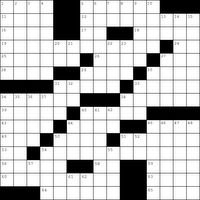Wordplay
 Crossword puzzle fans get their own movie
Crossword puzzle fans get their own movieBy Arthur Spiegelman
LOS ANGELES (Reuters) - Every Sunday morning, a nice, middle-aged man with a soothing voice drives listeners of a radio program heard across the United States to wonder if they are nuts or just stupid.
He is Will Shortz, crossword puzzle editor of The New York Times, a puzzle fanatic since about the age of 9, and the holder of the only known Ph.D. in enigmalogy (the study of puzzles). He is also "Puzzle Master" of National Public Radio's Weekend Edition, in which he and host Liane Hansen conduct deviously clever word games with listeners.
Now the 53-year-old Shortz, one of a select few to make a living out of concocting crossword puzzles and word games, is about to become a movie star thanks to a new documentary called "Wordplay," which is built around him and a few others who have made crossword puzzle solving their life's work.
The film, which opens nationally on Friday, centers on Shortz and a tense little yearly contest he created, called the American Crossword Puzzle tournament.
On NPR, Shortz drives his listeners to distraction with old-fashioned word games because even he has not figured out how to do a radio crossword.
Typically he will ask something like: "Think of a phrase of the form blank and blank. The initials of the two words in the blanks are R and F. Change the first letter of the second word from an F to a V, and the two new words will be synonyms."
"What are they?" asks straight woman Hansen, and Shortz answers, "Well, the phrase is rank and file, which becomes rank and vile."
PLAY ON WORDS
Then he and Hansen pepper a contestant with questions like, "All right, Janice, every answer today is a familiar two-word phrase with the initials W P, as in Word Play. For example, if the clue were something that comes up on the Internet, you would say Web page."
Soon the airwaves are full of phrases like wet paint, waxed paper, Warsaw Pact, wall plug, whipping post, Winter Palace and wolf pack.
"More people know me from the radio show than from the Times," Shortz said the other day in a phone interview for the film, which should make him even better known.
"We appear on 600 stations with an audience of 2 1/2 million. At the Times I edit the puzzles but usually don't write them. On NPR I write them."
His puzzles at the Times are famous for their clever pop-culture references, sly clues and gradual increase in difficulty designed to make you feel like a superhero if you can get the Saturday one done in pen in two minutes or under.
"It is not hard to make a puzzle hard -- all you have to do is use two obscure words. The challenge is to make it fair so that it can be solved. I think the Times puzzle is gold standard of puzzles," he said.
One of the most famous crosswords ever published in the paper is closely examined in the film. It is a puzzle that appeared the day before the 1996 presidential election and asked the question "lead story in tomorrow's newspaper?"
The puzzle, created by Jeremiah Farrell, had two correct answers "Bob Dole Elected" and "Clinton Elected" and hung on a clue to another word that also could go two ways -- bat or cat for black Halloween animal.
Shortz lives, eats and breathes puzzles except for a few hours a day when for fun -- yes fun -- he plays table tennis. "For 2 1/2 to 3 hours a day I am oblivious to everything. It's wonderful."
 Crossword puzzle fans get their own movie
Crossword puzzle fans get their own movie
No comments:
Post a Comment